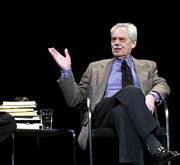When I began the project of this weblog back in 2002, I had multiple models abstractly in my mind of what I might want to do. My nephew, Dan Silliman, had shown me the possibility by posting his philosophy papers on his blog, or at least making them accessible through it. And there were at least three different models of critical writing that floated about in my head. One was Theodor Adorno’s Minima Moralia, another the short essays of Robert Creeley’s first collection of prose, A Quick Graph, and the third the reviews of Gilbert Sorrentino, collected into Something Said.
The number of poets from the New American generation & the one following who could reliably write poetry, fiction and criticism are exceptionally few: Creeley, Kerouac, Kelly, some folks would say Dorn. But hardly anyone seemed as completely ambidextrous – if that’s the word – as did this guy from
Not that Sorrentino loved those works uniformly. While the first five authors all were associated with journal Caterpillar, Clayton Eshleman’s journal that shared Sorrentino’s post-Projectivist/NYC perspective, Sorrentino didn’t much have time for the
Not much to say about Living with Chris, because it’s a picture-poem; a few lines of verse to a page, each page also containing a drawing, comic-strip genre, by Joe Brainard. Berrigan is a second-generation “
It’s worth underscoring here that, yes, Poetry magazine did call The Sonnets “a notable book” as early as 1968, by virtue of this passage. And that may be why Sorrentino thought to include that pamphlet.
Even in the works Sorrentino ultimately dismissed, he often took the time to ask what the poet was trying to accomplish, considering it on its own terms, rather than simply his. His passage here on Magowan’s Voyages recognizes that Magowan is an inherently uneven poet – something I’ve always thought was the consequence of not taking a position as to where he stood with poetry & its schools & histories – citing some of the very strongest lines in the book, acknowledging them as such. His section on Dodd here may well be the most serious consideration that poet’s writing ever received in print.
Many of the essays or chapters in Something Said aren’t essays, as such, but rather bundles of multiple shorter pieces published in different magazines. It gives his consideration of Paul Blackburn & Jack Spicer – he was one of the first reviewers to take both seriously & actively promote their work, writing an elegiac remembrance for Poetry for Spicer in 1965 – the feel of blog notes, except more carefully crafted. That, I think, is exactly what I was imagining when I was wandering around the foggy environs of
Sorrentino never got the big ticket acknowledgement for his accomplishments that he deserved. His fiction has too many layers for an age that thinks Philip Roth is serious writing, and he himself generally avoided the poetry scene. In all the years he was at Stanford, I never once saw him up at an event in
¹ Indeed, in Barry Alpert’s interview in Jacket 29, Sorrentino suggests that if he had to do it all over again, he might not write criticism at all.






